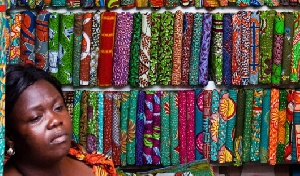…others cry out
The influx of pirated textile designs into the country has cost Akosombo Textiles Limited (ATL) about 75 percent of its business since 2009 and threatens to push the once profitable company over the edge, Mr. Stephen Dutton, ATL’s Sales and Marketing Manager, has said.
Mr. Dutton, who stopped shop of quantifying the loss in monetary terms, said: “ATL’s business has gone down by 75 percent since 2009, costing the company millions of Ghana cedis. It has affected our cash flow and it’s affecting our ability to operate properly. We have people complaining that we don’t supply the market. This is because we are short of working capital. When you have a hit on your business like that from fake, copied, smuggled goods, it becomes difficult to take it and carry on normally.”
Dutton added: “We would welcome any reduction in taxes and every incentive that makes us competitive. We are producing quality goods, employing designers to create new designs, investing money in our brand, advertising and promotion. What gives people the right to bring in goods that bear our designs? It’s wrong and it needs to be stopped.”
He spoke to the B&FT at a stakeholders’ forum on the National Crusade Against Trade in Pirated Ghanaian Textile Designs and Trademarks, held in Accra.
Mr. Mosses Zizer, the General Manager of Administration of Printex, a local textile producer, also said: “The industry is collapsing. Our main problem is not the importation itself, but the importation of pirated designs to sell at cheaper prices.
“There is a vetting committee which everyone is supposed to channel whatever they intend to import through to be verified and approval given. But knowing very well they will be found out, the pirates don’t go there; they just pirate and import.”
The issue of pirated textiles has been bugging the textile industry over the last five years. Coupled with high taxes and production costs, the industry is strained and increasingly becoming unprofitable.
From over 40 textile firms that employed more than 30,000 people, the country now has only four textile factories employing less than 4,000 people.
The Takoradi port was in 2006 designated as the only entry point for the importation of textiles. However, due to revenue concerns raised by the Ghana Revenue Authority (GRA), the entry points were expanded to include the Kotoka International Airport and the Tema harbour. This was later reviewed to allow entry via all borders in the country.
This, the anti-piracy taskforce contends, opened the floodgates for the influx of pirated textiles. The taskforce was created by the Ministry of Trade and Industry (MOTI) in 2008 and reconstituted in June 2013. A vetting committee was also instituted to vet any design that an importer intends to import for sale in Ghana.
Mr. Appiah Donyina, chairman of the taskforce, said the team has increased its surveillance and will continue with its education across major markets in the country. With the assistance of the police, the taskforce has seized and destroyed hundreds of pirated textiles from retailers.
B&FT investigations last year revealed that the Aflao border remains one of the major entry routes for smugglers of pirated textiles. The many entry points along the border make it difficult for security operatives in the area to check the menace.
“If there is evidence to suggest that restricting important to designated ports has been very effective, then they need to re-institute that. The free port in Lome might be encouraging people to bring goods that way,” Mr. Dutton said.
Business News of Wednesday, 5 February 2014
Source: B&FT
Pirated textiles push ATL to the brink
Entertainment












